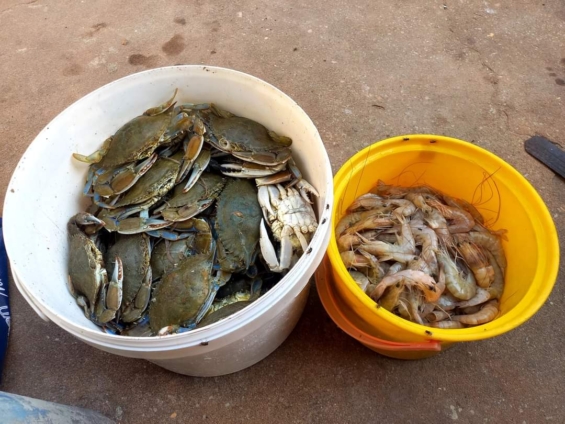The periodic opening and closing of the Azizadzi floodgates have inadvertently led to an unexpected bumper harvest of crabs and shrimps in the lagoons of the Keta and Anloga districts.
Local fishermen and residents have reported an increased abundance of these aquatic species, resulting in a significant economic boost for the communities.
The Azizadzi floodgates, strategically designed to manage water levels in the lagoons and prevent flooding in the surrounding areas, have unintentionally created ideal conditions for the proliferation of crabs and shrimps.
The fluctuation of water levels, coupled with the regular opening and closing of the floodgates, has allowed for the easy entry and exit of these aquatic species.

Fishermen in the area have observed a substantial increase in their daily catches, attributing the phenomenon to the changing water dynamics caused by the Azizadzi floodgates.
The unexpected windfall has provided a welcome relief for the local fishing communities, which have been grappling with various challenges in recent times.
"I have been a fisherman in this area for over two decades, and I have never seen such a prolific harvest of crabs and shrimps. It's like nature has rewarded us for the challenges we face," said Kofi Mensah, a local fisherman from Keta.
In an interview with MCE for Keta, Emmanuel Gemegah, the eased availability of crabs and shrimps has not only impacted the local economy but has also created opportunities for the expansion of businesses in the seafood industry.
Local markets are witnessing a surge in the supply of these prized catches, leading to lower prices and increased accessibility for residents.

However, concerns have been raised about the sustainability of this unexpected boon. Environmentalists and fisheries experts are closely monitoring the situation, urging the local authorities to conduct thorough assessments to ensure that the increased harvest does not lead to overfishing or negatively impact the delicate ecological balance of the lagoons.
Emmanuel Gemegah noted that the Keta and Anloga districts have become a focal point for researchers studying the interplay between water management systems and aquatic ecosystems.
The unintentional consequences of the Azizadzi floodgates serve as a reminder of the intricate relationship between human activities and the natural world, prompting a reevaluation of the environmental impact assessments for similar projects in the future.
As the communities in Keta and Anloga enjoy the unexpected abundance of crabs and shrimps, discussions are ongoing about the long-term management of the Azizadzi floodgates and how to balance the needs of flood control with the preservation of the region's rich aquatic biodiversity.
Latest Stories
-
George Twum-Barimah-Adu pledges inclusive cabinet with Minority and Majority leaders
42 mins -
Labourer jailed 5 years for inflicting cutlass wounds on businessman
43 mins -
Parliament urged to fast-track passage of Road Traffic Amendment Bill
44 mins -
Mr Daniel Kofi Asante aka Electrician
44 mins -
Minerals Commission, Solidaridad unveils forum to tackle child labour in mining sector
49 mins -
Election 2024: Engagement with security services productive – NDC
51 mins -
Retain NPP for the good of Ghana – Rebecca Akufo-Addo
51 mins -
‘Let’s work together to improve sanitation, promote health outcome’ – Sector Minister urges
52 mins -
Ellembelle MP cuts sod for six-unit classroom block at Nkroful Agric SHS
55 mins -
‘I’ll beat the hell out of you if you misbehave on December 7’ – Achiase Commanding Officer
57 mins -
AFPNC leads the charge on World Prematurity Day 2024
1 hour -
Court remands unemployed man over theft of ECG property
1 hour -
Election security rests solely with the police – Central Regional Police Command
1 hour -
NCCE engages political youth activists at Kumbungu on tolerance
1 hour -
‘In Mahama’s era students lacked chalk, but are now receiving tablets’ – Bawumia
1 hour

